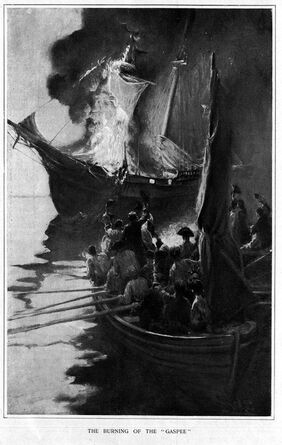
British officials in Rhode Island wanted to increase their control over trade—legitimate trade as well as smuggling—in order to increase their revenue from the small colony. But Rhode Islanders increasingly protested the Stamp Act, the Townshend Acts, and other British impositions that had clashed with the colony's history of rum manufacturing, maritime trade, and slave trading.
On June 9, Gaspee gave chase to the packet ship Hannah, but Gaspee ran aground in shallow water on the northwestern side of the bay on what is now Gaspee Point. Her crew were unable to free her and Dudingston decided to wait for high tide, which would possibly set the vessel afloat. Before that could happen, however, a band of Providence men led by John Brown decided to act on the "opportunity offered of putting an end to the trouble and vexation she daily caused." They rowed out to the ship and boarded her at the break of dawn on June 10. The crew put up a feeble resistance in which they were attacked with handspikes and Lieutenant Dudingston was shot and wounded in the groin. The boarding party casually read through the ships papers, before forcing the crew off the ship and lighting it aflame. Most of the men involved were also members of the Sons of Liberty.
This event and others in Narragansett Bay marked the first acts of violent uprising against the British crown's authority in America, preceding the Boston Tea Party by more than a year and moving the Thirteen Colonies as a whole toward the war for independence.
 RSS Feed
RSS Feed